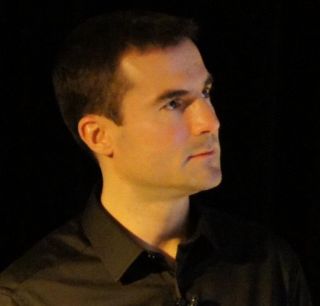Synesthesia
Projet Synesthéorie
France Now Has a Synesthesia Project Led by Vincent Mignerot of Lyon
Posted April 22, 2013
Around 100 years ago, when synesthesia was not only well-known, it was chic, French Symbolist poets Arthur Rimbaud and Charles Baudelaire famously took drugs to have cross-sensory experiences and would translate that into verse. Now, during the Synesthesia Renaissance currently underway, natural French synesthetes are taking up the baton and forming an artistic response to their colorful worlds. They are led by the charming Vincent Mignerot of Lyon, who answers some questions here:
Projet Synesthéorie Consultant Vincent Mignerot of Lyon, France. What forms of synesthesia do you have?

Projet Synesthéorie Consultant Vincent Mignerot of Lyon, France.
What forms of synesthesia do you have?
I can "see" my proprioceptive sensations and especially pain, I see letters and numbers in colors, all sounds are shapes, colors and mainly movements in all dimensions including the space behind me. Then all my thoughts, even the most abstract ones are also shapes and colors in an immersive 3-dimensional space.
When did you discover it? What was it like as a child?
When I was 22-23 years old I realized that not everyone was a synesthete. When I was a child all my sensations were stronger, I used to "taste the words."
When did you learn the name for it? How did that feel?
When I was studying clinical psychology I read an article raising the question of auditory and digital synesthesia. This discovery confused me but didn't especially disturbed me. It's three years ago when I discovered that imagined thoughts were also synesthesia and that most of the poeple don't have it, than I started studying more deeply this sensorial particularity and its richness
What do you do professionally?
I'm currently a consultant researcher within the Synesthéorie Project, http://synestheorie.fr/, which considers the study of synesthesia and its contributions to science, philosophy and art.
How are the French organized as synesthetes?
To my knowlegde, the association of "Synesthéorie" is the only which is interested in this particular issue. There is no forum of meeting place, organized events around this issue in France yet but I'm working on it.
What are your hopes with your website?
One of the main objectives, in addition to a better understanding of how synaesthesia works and its importance in the history of mankind, is to try to share that experience with those who do not live it. I'm already working with artists and laboratories to develop devices that would allow to share this experience.
What projects are French synesthetes currently involved in?
Nothing that I'm aware of, except my own.
What do you think of the current state of synesthesia awareness?
I think we are at the beginning of its understanding and it is going to teach us a lot about our relationship with nature and the world!
Are you very creative?
I'm not an artist, my productions are more philosophical and theoretical. But my texts are all driven by the shapes, colors and their arrangement within my internal cognitive process. This is what I presented within the concept of heuresthesia, (the ability to access to knowledge or objectivable competence by perception and without exercising a conscious or voluntary control) which is for me the source of inspiration for some creators, sometimes among the most important in the history of mankind: Newton, Einstein, Wittgenstein, R. Feynman, Mozart music, etc ...
The shapes I can see (linked to the music or to my thoughts, which are my richest synesthesia) are always dynamic, these shapes "look exactly" like the sounds or the ideas , following exactly the sense, the meaning of stimuli. Shapes are more important to me than colors. I can see sounds behind me and my ideas are all around my body ;-)
Their Facebook page is here:


